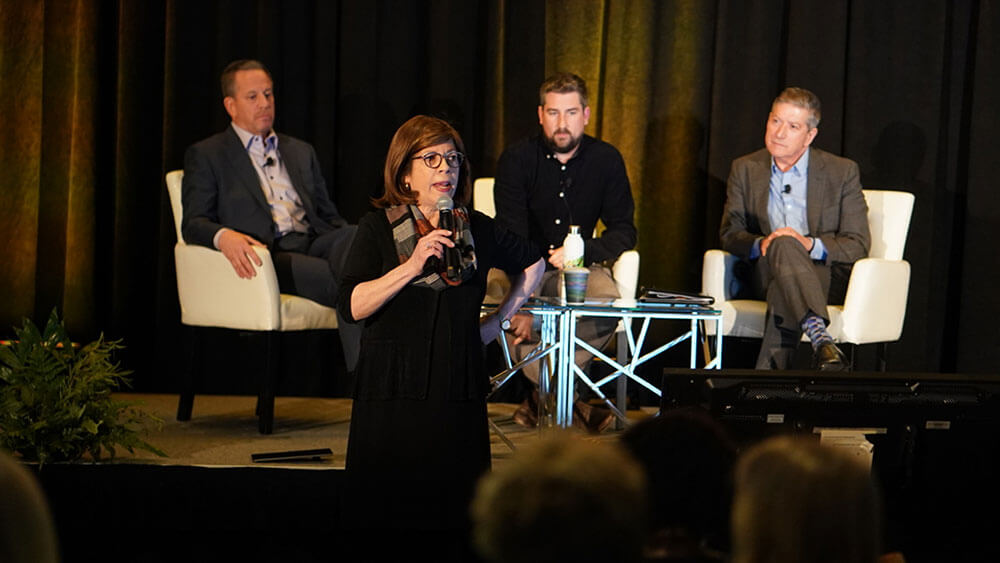
Donna Kastner moderates as David Peckinpaugh (from left), William Thomson, and Joe D’Alessandro discuss homelessness and trafficking during a Jan. 8 Convening Leaders session. (Jacob Slaton)
Neither homelessness nor sex trafficking is easy to talk about. But, in the case of homelessness, addressing the issue is “critical to the future of this industry and the sustainability of travel and tourism communities,” Joe D’Alessandro, president and CEO of San Francisco Travel, said Jan. 8 at Convening Leaders.
Homelessness “is not just a problem just in my part of the country, it’s a national problem that’s getting worse,” said D’Alessandro, who presented at the session, “Finding Solutions to Social Justice Issues From Homelessness to Human Trafficking.” “Issues surrounding homelessness are having a negative effect on the brand of all of our destinations and the brand in the United States, frankly.”
Taking on the tough topics along with D’Alessandro were William Thomson, founder of Barcelona-based Gallus Events, and David Peckinpaugh, president of Maritz Global Events Inc. Under Peckinpaugh’s leadership, the company has taken an activist role in training employees in how to recognize and report suspicious activity related to sex trafficking. Maritz was one of the first industry organizations to sign the Code of Conduct for the Protection of Children from Sexual Exploitation in Travel and Tourism, in partnership with ECPAT-USA. PCMA announced Jan. 7 that it had signed the Code.
All three panelists outlined the scope of the related problems of homelessness and sex trafficking with grim statistics: In the United States, more than 550,000 people are homeless, and more than 200,000 people sleep outside or in places that are unfit for human habitation nightly, according to D’Alessandro. Globally, human trafficking is a $100-billion-a-year business, with approximately 1.2 million children trafficked every year, Peckinpaugh said. Of youth who have experienced trafficking, 68 percent have also had an experience of homelessness, according to research conducted by Loyola University.
The session was focused, however, not just on talking about the issues, but on how solutions to those problems can come through the business events industry.
“We can’t be embarrassed and think that [homelessness] is just going to go away, because it’s not,” D’Alessandro said. “We have to get involved in finding the solutions that work in our communities and be actively involved. And hospitality can lead it.”
”I’m here with a message of hope,” said Thomson. “Change can happen — and it can happen in a relatively short period of time.” Although Gallus Events is based in Barcelona, Thomson grew up in Glasgow, Scotland, a country that once was known the murder capital of Europe. When Scotland decided to treat violence as a public health issue, rather than a public safety issue, within a generation, there was a dramatic drop in violence, Thomson said. The country has taken a similar approach to the problems of homelessness, setting a goal of eliminating homelessness by 2021, he said.
Event organizers are playing a part, Thomson said. For example, a single event held in 2017 in Edinburgh raised 10 million pounds to build housing for the homeless. That same year, Thomson’s company hosted a hackathon to find or improve on solutions to alleviating homelessness in Glasgow, his hometown, an initiative that Thomson plans to expand later this year.
“When we bring people together to a good event, that’s great. But I think our events can do good,” he said. “And when I look at a room full of American event organizers and I think, ‘What can you do?’ my heart just swells. Because I think you can start to end homelessness. If you add the skills and the determination that event organizers have and put it toward any problem, than I think solving it is a mathematical certainty.”
At Maritz, the company has been actively educating its employees about how to recognize the signs of trafficking for nearly eight years, Peckinpaugh said. But he didn’t make the connection between sex trafficking and homelessness, he said, until he began to work with others to put the Convening Leaders session together. “So the journey of learning continues. Hopefully we all can make a difference and an impact.”
When the audience was polled about whether or not they had witnessed suspicious behavior in their travels, more than a quarter said yes. If this issue of human trafficking “hits your heartstrings, go back to your organizations, see if you can get involved, see if you can sign The Code,” Peckinpaugh said, or get involved in other ways.
D’Alessandro shared a long list of initiatives underway in San Francisco to address the problems of homelessness, including a program that hires and trains homeless and formerly homeless individuals as part of “Downtown Streets” teams who work in downtown San Francisco, including around the Moscone Center.
“It’s a first step and a first step is really important,” he said. “The last thing I want to say is that these people in the streets are human beings. And I encourage you to look them in the eye when you walk by.”
